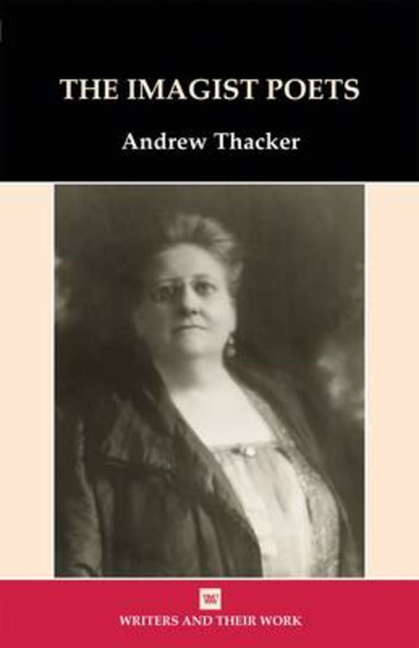Book contents
- Frontmatter
- Dedication
- Contents
- Acknowledgements
- Biographical Outlines
- Abbreviations
- Introduction: The Formation of Imagism
- 1 Movements and Modernism
- 2 Publishing, Publicity, and Magazines
- 3 Prefaces and Manifestos
- 4 Modern Themes
- 5 Urban Images
- 6 Gender and Sexuality: ‘Amygism’ and ‘H.D. Imagiste’
- Afterword
- Notes
- Select Bibliography
- Index
5 - Urban Images
- Frontmatter
- Dedication
- Contents
- Acknowledgements
- Biographical Outlines
- Abbreviations
- Introduction: The Formation of Imagism
- 1 Movements and Modernism
- 2 Publishing, Publicity, and Magazines
- 3 Prefaces and Manifestos
- 4 Modern Themes
- 5 Urban Images
- 6 Gender and Sexuality: ‘Amygism’ and ‘H.D. Imagiste’
- Afterword
- Notes
- Select Bibliography
- Index
Summary
Some overlook the fact that the most renowned Imagist poem, Pound's ‘In a Station of the Metro’, is actually a poem about a characteristically urban and modern experience, the mundane fact of travel by underground railway: ‘The apparition of these faces in the crowd;/ Petals on a wet, black bough’. One of the dominant ways to read the poem has been influenced by Hugh Kenner's brilliant analysis in The Pound Era (1971), where the Paris Metro of the title gives way to a symbolic underworld: ‘this is not any crowd, moreover, but a crowd seen underground, as Odysseus and Orpheus and Koré saw crowds in Hades’. Locating Pound's poem within this literary geography, how- ever, loses as much as it gains, since although it allows us to trace another lineage for the classical influences in Pound's verse, or indeed in modernism more generally, it takes the poem away from the material spaces of the modernist city. Pound's poem is about making sense of a particular urban experience, the individual lost but finding beauty amidst the mass of a crowded Metro station. To understand it fully, I would argue, requires us to understand how the early twentieth-century environment found in cities such as London and Paris was registered in the formal structures and styles of Imagist poetry. Pound's Metro hokku, an adaptation of an ancient Japanese form, seemed to match the experience of glimpses of faces caught in the new urban spaces of modernism. Since ‘In a Station of the Metro’ is the most well-discussed of such Imagist poems of the city, this chapter shifts the focus to some of the other poems that treat the urban experience. In particular this chapter examines images of the urban experience by Flint and Fletcher and also Lowell's application of ‘polyphonic prose’ to the representation of the city.
Interestingly, some other Imagist poems in addition to Pound's ‘Metro’ took urban transport as their setting. Aldington published ‘In the Tube’ in The Egoist in 1915, two poems by Flint, ‘Tube’ and ‘Accident’ are set on trains, and Fletcher published a long poem about commuting across the city, ‘London Excursion’, in the 1915 anthology.
- Type
- Chapter
- Information
- The Imagist Poets , pp. 67 - 88Publisher: Liverpool University PressPrint publication year: 2011



